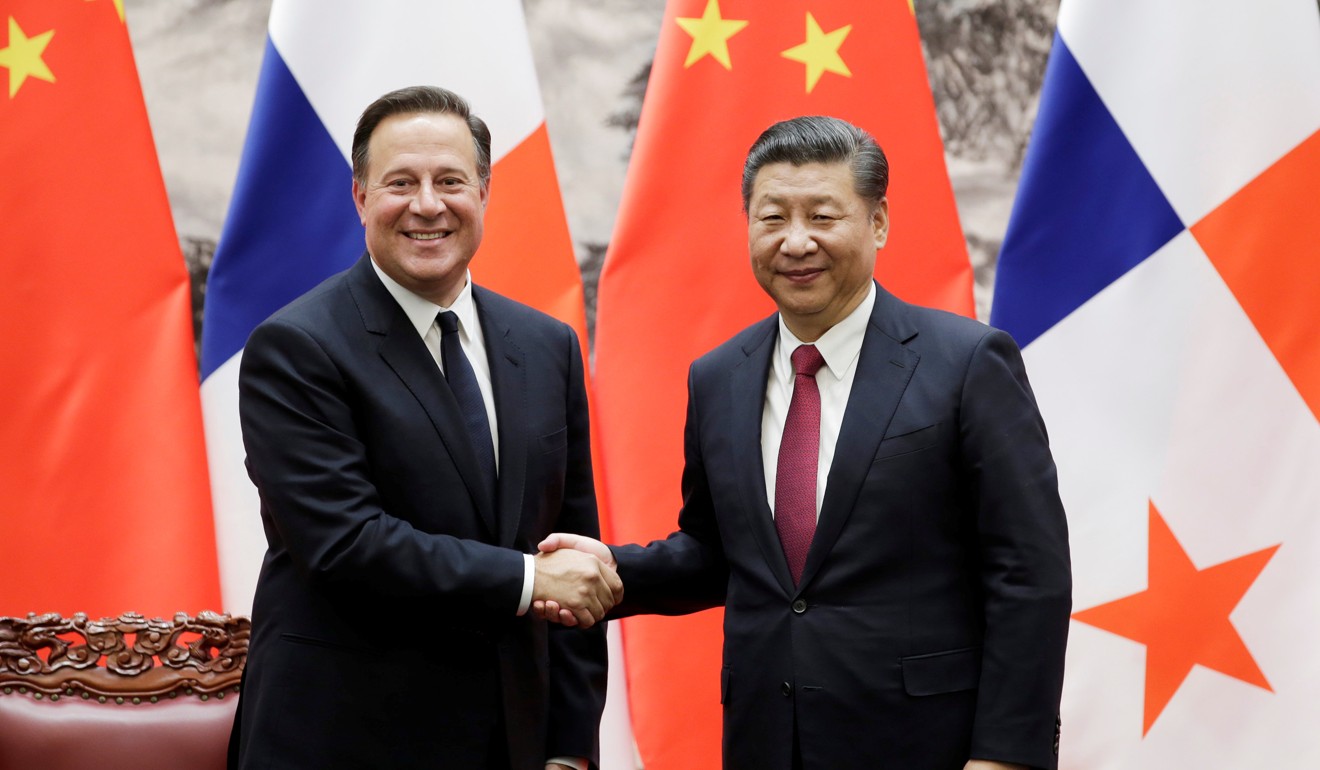
Xi in Panama: Chinese president’s visit to US backyard tells Washington two can play influence game
- Xi seeks closer ties with US ally in Central America
- Commerce, technology and infrastructure on China’s agenda
After his high-stakes meeting with Donald Trump next week to defuse trade tensions, President Xi Jinping will head for America’s backyard in a visit that may cause unease in Washington.
In a trip that observers said would underline Beijing’s efforts to cement ties with Latin America, Xi will make a state visit to the Central American nation of Panama at the start of next month, the Chinese foreign ministry said on Friday.
The visit, which was confirmed by Panama, would be the first by a senior figure from Beijing since Panama officially cut ties with Taipei and established a formal alliance with Beijing in June last year.
Xi is expected to meet his counterpart Juan Carlos Varela in Panama City, where the two will witness the signing of about 20 agreements to cooperate in areas such as commerce, technology and infrastructure during the “unprecedented visit” from December 2-3, the Panamanian president’s office said.
Xi’s visit is to begin a day after his highly anticipated evening dinner meeting with Trump on December 1, following the G20 summit in Buenos Aires. The world’s two largest economies, now locked in an escalating tariff war, seek to calm tensions that have spilled over from their contest for geopolitical influence.
Chinese vice-minister of foreign affairs Qin Gang said on Friday that Xi’s visit would reaffirm Beijing’s engagement with Latin American countries. Qin also said cooperation between China and the continent would “not change” even though some Latin American countries faced rising challenges in an unstable global environment.
Washington has been critical of Beijing’s growing influence in Latin America, and high-level officials in the Trump administration have warned America’s neighbours to be wary of Beijing’s inward investment strategy that has gone beyond energy and raw material extraction to car manufacturing, tech and telecoms, while reaching into South America and the Caribbean.
At the Apec summit in Papua New Guinea last week, US Vice-President Mike Pence warned smaller countries not to be seduced by Beijing’s Belt and Road Initiative.
Sitting in Central America and bordering Costa Rica and Colombia, Panama is widely seen as important to US dominance of the Western hemisphere, with the 82km (51 mile) Panama Canal that links the Pacific and Atlantic oceans critical to its economy.
Pompeo warns Panama about accepting China’s ‘belt and road’ loans
China is the second biggest user of the canal after the US, and during his visit to Beijing in November last year, Varela said Panama supported Beijing’s infrastructure programme.
Former Mexican ambassador to China Jorge Guajardo said Xi’s visit to Panama, coming soon after Pence’s criticism, would show that Beijing “can also play the game of influence with the US”.
“Panama is different,” Guajardo said. “Going to Panama is Xi’s way of signalling that China can also play that game, vying for influence in a traditional US zone of influence. It sends the message that China treasures these relations and will not take them for granted.”

Dong Jingsheng, vice-director of the Latin America Research Centre at Peking University, said Xi was expected to play up the belt and road plan, now the cornerstone of Chinese foreign policy.
But while Beijing had been making an ambitious push to strengthen ties with Latin American countries, its influence, although growing, could hardly catch up with that of the US, especially when Chinese investment was not so stable and much less diversified, he said.
“China could hardly pose a threat to the US in the region and, to China, Sino-US relations are much more significant,” Dong said.
Panama’s president asks US to ‘respect’ Taiwan snub
Francisco Luis Perez, a Latin American studies expert at Taiwan’s Tamkang University, said that while Beijing might seek to counter the US presence in the Indo-Pacific region by increasing its influence in Latin America, Panama might see closer ties with Beijing as a risk to its relationship with Washington.
“Following the stern warnings from the United States, Xi’s trip keeps on being a potential bargaining chip to get things from the US, but it also constitutes a serious risk of creating tensions with a geographically close power,” Perez said.
“I do not expect Panama to risk and make strategic or political pacts with China during the trip, but instead to focus on economic issues without much military or strategic impact.”

